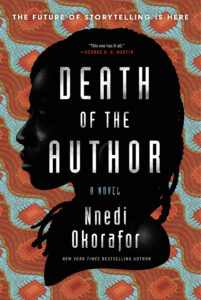
Nnedi Okorafor has gained plenty of plaudits in genre fiction over the past decade, and when I saw that she was releasing a speculative literary novel about a writer of robot stories, I put Death of the Author on my list of books to watch in 2025. It took me a few months, but I finally got a chance to give it a read this fall.
Death of the Author follows a disabled Nigerian-American writer who hits it big in her first foray into genre fiction. The narrative intersperses episodes in her own life with pieces of her fiction and snippets of interviews from friends and family, building up the portrait of a complicated figure pressed by her family, her fans, her body, and her ancestral land.
I’d read enough reviews to pretty well set my expectations going in, so it was no surprise to find a story that’s more the portrait of a life than any particular narrative arc. Certainly, there is progression in the life of the lead, but there are plenty of threads that take on enormous significance at various parts of her life before fading back into the background later.
The lead herself, while often sympathetic, is not an especially lovable figure. She brooks no nonsense, makes wildly impulsive decisions, and fears being tied down nearly to the point of paranoia. This often puts her at odds with a family full of strong-willed, opinionated high-achievers who love her but generally do not trust her to direct her own life without their influence. It’s a dynamic that feels deeply rooted in true experience, with intermittent strife even without any obvious heroes or villains.
That groundedness of an extremely lifelike lead remains the book’s biggest strength for the duration, even as the focus shifts back and forth from familial squabbles to relationships with lovers and fans to dangerous decisions about the direction of her life. She burns with a desire to visit Nigeria, even while knowing it’s especially dangerous for a woman living without the use of her legs. She wants to walk strongly enough to test dangerous, experimental assistive technology. She wants a lover but doesn’t want a lifelong commitment.
For me, the most gripping subplot is the one that sees her losing control of the way her work is received. Her robot novel, Nigerian setting and all, is initially a smash hit that earns her plaudits from all corners. But it isn’t long before she’s dealing with whitewashed adaptations, demands from fans to speak out about their causes—many of which conflict with each other—and pressure from both publishers and fans to deliver the sequel. It’s not a subplot that’s necessarily decisive in the shape of her overall character arc, but it delivers deeply compelling conflicts that feel like they could walk right off the page and into real life.
Perhaps my biggest struggle with the book comes in the chapter starring the robots that are the subject of the lead’s novel. Their story dives into interesting themes of bodily autonomy, disability, and sectarian squabbles even in the face of existential external threats. But the storytelling in these sections just isn’t as compelling as in the contemporary frame story. It’s easy to see the role those segments are meant to serve, but it’s rarely a good sign when you find yourself planning your reading so as to not get stuck on the slow chapters.
The ending leaves some plot threads hanging, which I expected, even if I’d have preferred a resolution that ties them more closely together. It also introduces some ambiguity that makes for some fascinating discussion fodder, even if it doesn’t add much closure. Overall, it’s a finish that does the job but doesn’t elevate the book that came before.
I’m reading a bit outside my ordinary genre here, so it’s very likely Death of the Author could hit differently for readers with different tastes and experiences. But for me, it’s a book in which some weaker segments are balanced by an excellent portrait of a complicated main character. It doesn’t come together as thoroughly as I’d prefer, but the characterization is excellent, and there are some tremendous subplots–there’s plenty to like in this one.
Recommended if you like: litfic, complicated characters and families.
Can I use it for Bingo? It’s Published in 2025 by a POC Author, involves being a Stranger in a Strange Land and includes High Fashion.
Overall rating: 15 of Tar Vol’s 20. Four stars on Goodreads.
